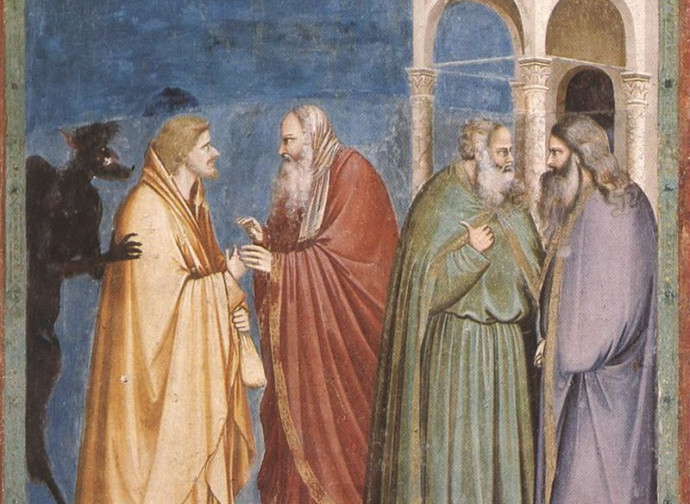The death of Judas, the weight of avarice
We continue our Lenten journey with Father Cornelio a Lapide's (1567-1637) commentary on the Passion according to the Gospel of Saint Matthew. Judas ends up hanging himself, overwhelmed by the "tyranny of greed". While the field bought with the price of treason retains a particular property. (Edited by Father Konrad zu Löwenstein).

Now it was avarice that drove Judas to this fate. “Hear ye this,” says St. Chrysostom; “hear it, I say, Ye covetous. Ponder it in your mind what he suffered. For he both lost his money, committed a crime, and lost his soul. Such was the hard tyranny of covetousness. He enjoyed not his money, nor this present life, nor that which is to come. He lost them all at once, and having forfeited the goodwill even of those to whom he betrayed Him, he ended by hanging himself.”
This confession of Judas, then (not in word, but in deed), was a clear proof of Christ’s innocence, and it assuredly ought to have kept the Jews from killing Him, if they had only had the smallest amount of shame. But their obstinate malice could not be restrained even by this strange portent.
Symbolically: St. Bede remarks (in Acts i.), “His punishment was a befitting one. The throat which had uttered the word of betrayal was throttled by the noose. He who had betrayed the Lord of men and angels hung in mid-air, abhorred by Heaven and earth, and the bowels which had conceived the crafty treachery burst asunder and fell out.” …St. Augustine (Lib. Hom. 1., Hom. xxvii.), “That which he wrought on his own body, this was also wrought on his soul. For as they who throttle themselves cause death, because the air passes not within them, so do they who despair of the forgiveness of God choke themselves by their very despair, that the Holy Spirit cannot reach them.”
But the chief priests said, It is nor lawful for to put them into the treasury. Corban is the same as offering. It here signifies the treasury into which the offerings were cast…Because it is the price of blood. What hypocrisy! They suffer not the price of Christ’s blood to be paid into the treasury, whereas they had taken money out of it to procure His betrayal and death.
And they look counsel, and bought with them the potter’s field, to bury strangers in. “They saw,” says Origen, “that it was most fitting that, as the price of blood, it should be expended on the dead and their place of burial.”
Strangers: for the inhabitants had their own burial-places. And God so ordered it that this field should be a standing witness both of Judas’ repentance and of Christ’s innocence. “The name,” says S. Chrysostom, proclaims their bloody deed with trumpet tongue, for had they cast it into the treasury, the circumstances would not have been made so clearly known to future generations.”
Symbolically: It was thus signified that the price of Christ’s Blood would benefit not Jews only, but strangers, the Gentiles, i.e., who would hereafter believe on Him. So St. Hilary, “It belongs not to Israel, but is solely for the use of strangers.”
Wherefore that field was called Haceldama. A Chaldean word. The Ethiopian and Persian versions agree as to its meaning. Adrichomius (Descr. Jerus. Num. 216) describes the spot, and a peculiar property of the soil, that it destroys within a few hours the dead bodies which are placed in it, a property which it preserves even when taken elsewhere. …
“The field bought for strangers with Christ’s Blood is the Church (St. Chrysostom in loc.; St. Augustine, Serm. cxiv. de Temp.), and particularly the state of ‘Religious,’ who count themselves strangers upon earth, and citizens of Heaven, and of the household of God,” &c. See also 1. Pet. ii. 11, where St. Chrysostom says, “Nothing is more blessed than this burial, over which all rejoice, both angels and men, and the Lord of angels. For if this life is not our life, but our life is hidden, we ought to live here as though we were dead.” …
